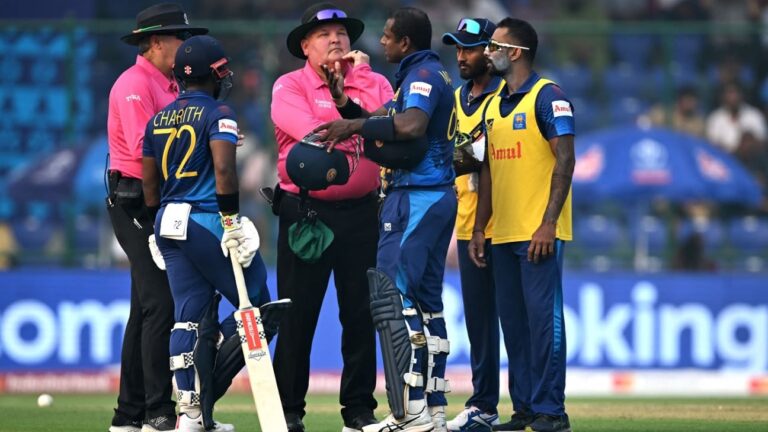
Either way, Mathews was drawing a line between what constituted a fair dismissal for “time limit” and what constituted time taken from the game to replace defective equipment.
However, the playing conditions, as they are, do not take into account equipment malfunction; they only stipulate that the new batter be ready to receive the ball within two minutes of the previous dismissal, which, on a strict interpretation of the rule, Mathews was not.
However, umpires frequently allow equipment to be changed mid-game if necessary, particularly helmets and bats. If the strap had broken a ball in Mathews’s innings, for example, there probably wouldn’t have been any issues with ordering a replacement and taking some time to choose one.
“We talked about player safety and you tell me if it’s okay for me to guard without the helmet,” Mathews said. “That’s where the umpires could have done a bigger job at that point because they could have gone back and checked. They don’t let a wicketkeeper for a spinner go without his helmet. So how can I take my guard without my helmet? It’s completely a malfunction of the equipment.
“You need to have common sense in terms of using technology. It was clearly a malfunction, [the strap] just came out. She didn’t need to throw it and break it”
Angel Mateo
“What’s the point of not checking it at the time and then checking it later?” Mateo continued. “You need to have common sense in terms of using technology. It was clearly a malfunction, [the strap] just came out. He didn’t need to throw it and break it.”
Fourth umpire Holdstock had also suggested mid-match that it was the batsman’s responsibility to have “all the equipment in place”.
Mathews scoffed at this idea.
“That’s pretty ridiculous. It’s our responsibility, yes. If I came out to bat against a fast bowler, obviously it’s my responsibility,” he said. “But something is coming out, do you really think I would know if it was going to come out? I don’t understand the logic.”